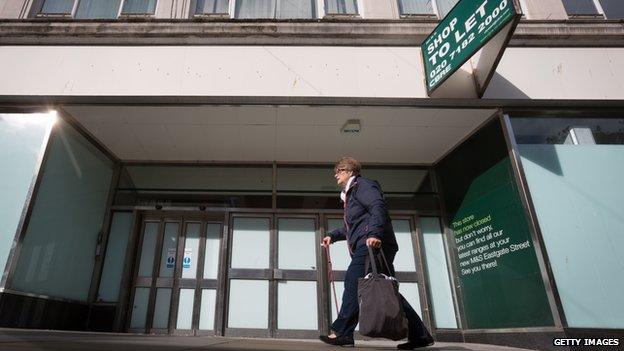Autumn Statement: Business rates face review
- Published

Business rates have been blamed for the decline of High Streets
A full "structural review" of the unpopular business rates system in England is to be carried out.
Chancellor George Osborne made the announcement in the Autumn Statement.
The review will examine the "complete structure" of the system, which has been in place since 1988, a Treasury spokesman said.
However, the outcome is expected to be fiscally neutral, meaning that the total sum collected from businesses will not change.
'Shot in the arm'
The current system has been criticised for leading to big discrepancies in bills. Companies with similar turnovers can pay wildly different sums for business rates because their properties have varying "rateable values" depending on the size and location of their premises.
John Cridland, director-general of the CBI, said the moves to reform business rates would be a "shot in the arm" for companies.
Helen Dickinson, head of the British Retail Consortium, said: "We want a system that brings investment and jobs to the High Street without punishing retailers who trade online because rates are so expensive."
Rates are collected by councils. Claire Kober, chair of the Local Government Association's resources board, urged the government to take into account the impact of e-commerce as part of the review.
"Councils could do much more to support small businesses if we were able to set rates and discounts locally," she said. "It will be crucial that government's reform of business rates make this a truly local tax."
The Forum of Private Business said the devil would be in the detail of the review, which will not be completed until after the next general election. Phil Orford, its chief executive, said: "We are keen to see all parties commit to making concrete moves to tackle an issue that many businesses feel has needed addressing for some time."
Mark Rigby, chief executive at CVS, which helps companies manage business rates, said: "As long as the chancellor remains wedded to fiscally neutral reform and a 'zero sum game' in business rates, there are a limited range of options for change."
And Paul Turner-Mitchell, a business rates specialist, added: "Reforming the system without addressing the yield could be like rearranging deckchairs on the Titanic."
The chancellor also announced that the discount for retailers with properties that have a rateable value of less than £50,000 would be increased by £500 to £1,500 next year. The rise will bring the total relief on business rates to £1bn and help some 500,000 companies.
The cap on increases in business rates will remain pegged at 2%.
Mr Rigby added: "The chancellor's steps to help small businesses will give some comfort to ratepayers. A bolder move would be to lift more smaller businesses out of rates altogether."
Highest in Europe
The review announced goes further than one announced in the Autumn Statement last year into the way councils in England collect business rates. Its interim findings are due to be published later this month, the Treasury said.
Business rates are handled differently in Scotland and Northern Ireland. The Treasury said on Wednesday it had agreed with the Welsh Government to give it full control of business rates in Wales.
The rates paid by English businesses are the highest of any European Union country and can be a company's biggest expense after wages and rent.
They have been blamed for the decline of many High Streets and the rising number of vacant shops.
Business rates are calculated according to the rental value of the property a company uses. They date back to the Poor Law established in 1601.
Those valuations are still based on property prices in 2008, before the economic downturn hit the value of commercial real estate, as the government postponed a revaluation scheduled for last year.
- Published2 December 2014
